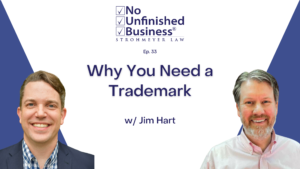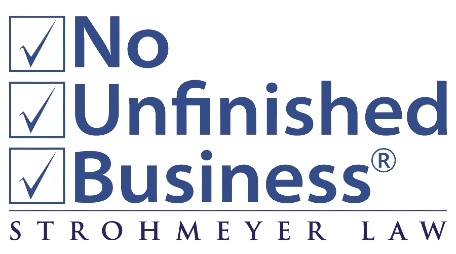The Basics of Prenuptial Agreements
You’re getting married and you wanna know: Do I need a prenuptial agreement and how do they work?
I’m licensed here in Texas and Texas is a community property state. This means that all property owned by spouses during their marriage is going to fall in one of two categories under this system. Either the property is community property, in which case both spouses have an interest in it, or it’s going be separate property, which case it only belongs to one of those spouses.
This is going to have a lot of profound implications if/when the marriage comes to an end, either via divorce or when one of the spouses dies.
What is community property?
So as a quick refresher, what is community property? Well, the easy answer is it’s anything that spouses acquired during a marriage while they’re married in Texas.
What is separate property?
Separate property is defined with a couple rules and a few exceptions.
First, it’s anything owned by either spouse before the marriage. A common misconception is that once you get married, everything that you have magically turns into community property. This is not the case. Once you get married, everything you own, whether it’s your socks, your bank account, or your car, remains your separate property. You came into the marriage with it, you get to leave the marriage with it. Anything acquired after you get married, though, is going to be community property.
The second type of separate property is anything acquired by either spouse as a gift, bequest, or devise during the marriage.
This can cause a lot of confusion. If a relative dies and leaves you something in their will, that’s gonna be your separate property, even if you’re married. Likewise, on the day of your marriage when you’re getting all those gifts, those actually aren’t community property, it’s actually a gift of separate property to each of you. If we think about a hundred dollar bill gifted to each of the spouses, one spouse will have a half separate property interest in that a hundred dollar bill, and the other spouse will have a one half separate property interest in that same bill. It’s not community property, and neither one can take the entire bill for themselves. It’s both of theirs, but as split separate property.
The last category of separate property is recoveries from personal injuries. Basically, if you’re in a car wreck or something like that, where you get injured and you recover money damages, that’s going to be your separate property. There’s nothing really communal when you alone get injured.
To recap, three broad exceptions to anything being community property. First, anything you bring into the marriage. Second, anything you received by gift, bequest, or devise. Finally, any recovery for personal injuries.
But there’s one last little wrinkle on this.
What if you have separate property that generates income?
You have a rental house that you brought into the marriage and that generates rental payments, for instance. Those rental payments – income from the separate property – are going to be community property.
Schedule a free consultation with Strohmeyer Law to protect your family with an estate plan.
Who needs a prenup and why?
When we start thinking about a marriage, we want to think about who’s going to own what, when the marriage comes to an end. So for a lot of first time marriages, this really isn’t gonna be a big deal if you’re not bringing much into the marriage, probably because you’re in your twenties or early thirties and getting married for the first time. You don’t have a whole lot on your balance sheet that you’re trying to protect.
A lot of cases say, maybe we don’t even need any agreement. But for those of you who are still thinking about it, why do we want to think about it? And what do we want to think about? Well, what we’re trying to do is figure out what’s going to happen during the marriage.
There are reasons that we want to allocate certain property to certain people. We want to make sure that certain assets are clearly labeled as the separate property of one spouse or the other. As a comparison, I once worked on an Oregon marital property agreement. And one of the things that I learned was that a, an interest in a trust for the benefit of one spouse, even if it was created by that spouse’s family and never listed the new spouse as a beneficiary, that new spouse, even though they weren’t a member of the family, even though they were never listed as a beneficiary, could potentially claim an interest in that trust.
If they ever got divorce. This is gonna be a shock for a lot of people, probably outside of Oregon, but just thinking through what are the things that are on your balance sheet that may end up being on the table during a divorce. So if we’re thinking that we need to make sure we know who owns what and why, what do we wanna do when we get started with a prenup.
Do you have enough lead time?
Well, first things first, when are you getting married? The more lead time we have for this agreement, the better we can ensure that we negotiate our provisions on our side of the agreement, but also working with the other attorney who’s representing the other spouse.
Side note: both parties are going to need to have an attorney. Once somebody came to me and said, “Hey, my fiancee and I agree, will you just draft up one marital agreement for both of us?” The answer is no, I can’t. We need both parties to be represented. And if one attorney is drafting the agreement for both sides, it’s gonna be the first thing to go in court. That agreement’s not gonna be worth anything.
So we wanna make sure we’ve got enough time between now and the marriage to make sure that we can get the agreement negotiated, signed, and sealed before everybody walks down the aisle consideration.
What do you own?
Number two, what does each spouse own? As part of this agreement, each spouse is going to have to disclose everything they own to the other.
Now we don’t need to get into “three pairs of red socks and two pairs of blue socks,” but we do need to know roughly how big their financial pie is and how big each slice of that pie is. It’s just fair to make sure that each party knows what they’re giving up in terms of future income or future community assets.
They have a right to know. And if you don’t tell or they don’t tell you, it’s a reason to unwind the entire agreement. So know that you’re gonna need to have a good list of all your assets going into the agreement.
What do you want the prenup to do?
Next think about what sort of agreement do you want in place? Are we just confirming what’s yours is yours and what’s mine is mine?
Or are you perhaps trying to set up some other type of agreement, where on each birth of a child you’re setting aside certain amounts of money for that child’s care and education? Maybe you’re concerned that if something happens, we’re making sure that this certain amount is left for the spouse to ensure that they’re taken care of.
If you have some sort of expectation of who will own what or what they’re going to receive, and it means a lot to you, your prenup is a chance to get it in writing.
Is this a first marriage?
The last thing to think about: is this the first marriage for each spouse?
As I mentioned before, for a lot of spouses, a prenup is something that they think about, but don’t actually go through with for a lot of first marriages. It might not make logistical sense. You can set up your accounts in such a way that you’ll keep your separate properties separate, you’ll keep any income that would be community property in a different account. You can talk to your financial advisors about how to set that up with some creative account management.
So when does it really make sense? If this is your second marriage, and you’ve already been through the divorce process once, you probably want to make sure you keep what you have. Many times in second marriages, you’ll have kids that you wanna make sure that you’re protecting and you wanna make sure that your property goes to your children, no matter how much you care about your new spouse.
You may have family assets that you wanna make sure remain yours. This is important for a lot of families. Perhaps your family has interest in a house, or a trust is coming for you. You want your inheritance to remain yours.
It’s not that you don’t like your new spouse, of course you do, but we’re not providing for them. And we want it to be clear that what is yours stays with you and your kids.
Pressure from family members
The third reason to have a prenup is you may be getting pressure from other family members just to make sure you’re protecting things. Again, this is a reason that some people go through this, they wanna make sure that their children are protected because of their own experiences.
There’s nothing wrong with this, but do realize that this is a reason that you may have this put in front of you.
In Summary
So the three big reasons to have a prenup. This is your second marriage and you don’t wanna have to go through a messy divorce. Reason two, you’ve got significant other assets that you want to protect.Reason three, you’re getting pressure from outside family members, and it’s just going to make things easier to clarify up front.
End-of-Year Strategies for Irrevocable Gifting Trusts
As the year draws to a close, there are some crucial actions to take with an irrevocable gifting trust.
What to Do If You Receive an IRS Letter
Receiving a letter from the IRS might send shivers down your spine. So what's your first step? Is it always a cause for alarm? Let's walk through what you should do.
Why You Need a Trademark
We'll explain the the four main areas of intellectual property for business owners, why trademarks are crucial, and how to get your marks registered.





